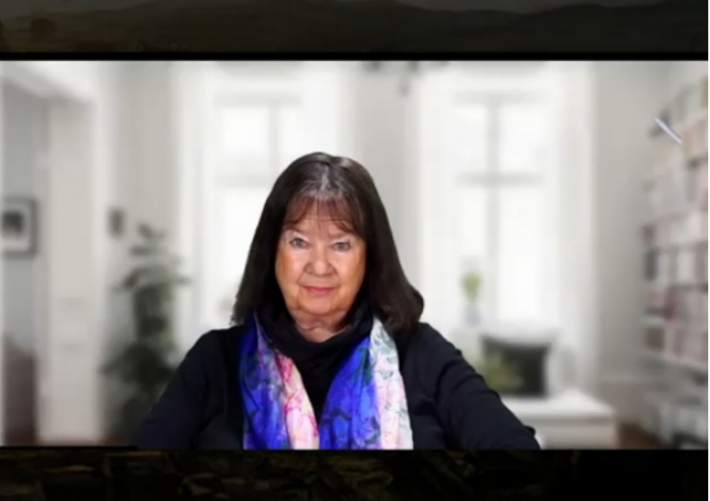March 23 (EIRNS)—Helga Zepp-LaRouche was part of a panel interviewed yesterday by Pakistan’s PTV host Faisal Rehman about the Organization of Islamic Cooperation (OIC) foreign ministers’ meeting in Islamabad on March 22. Here are the exchanges in the interview with Mrs. Zepp-LaRouche, who is the founder and chairwoman of the Schiller Institute. The entire program is posted to YouTube.
FAISAL REHMAN: Let’s see what the lady has to share regarding this. Helga, let me put a straight question to you: Tell us, being a woman living in Europe what exactly do you think about the religion Islam, your perception? How do you perceive it?
HELGA ZEPP-LAROUCHE: I think it’s one of three great monotheistic religions. It’s building on Judaism and Christianity, and I think that the ecumenical dialogue among these three religions is very important as a potential peace factor in the world. I think Prime Minister Imran Khan said something very important: He said that the OIC should unite, and together with China and put maximum influence and pressure on both Ukraine and Russia in order to have a ceasefire and come to an agreement. I think that’s a perfect example how Islam can play a very positive role as an instrument peace.
On the negative side, I think one problem, and this was also mentioned that the Islamic world did not correct the narrative which started to build after 9/11. I think that is still a task, because 9/11 was not as it was presented in the official narrative and the war against Afghanistan—if you think about the people in Afghanistan who were involved in this war, it’s very little if any at all. In any case, I think the origin of 9/11 is a big question which would really need to be analyzed much more in depth.
Then naturally, one cannot forget that Samuel Huntington in his book Clash of Civilizations, he said when the East-West conflict was finished after the collapse of the Soviet Union, that basically one needed to replace the East-West conflict with a North-South conflict, and then he started to talk about the so-called “unsurmountable” conflict between Christianity, Islamic, Hinduism, Confucianism. I read this terrible book and I came to the conclusion that Huntington knows very little about all of these religions and cultures. But nevertheless, this was instigated as a tool of the British Empire and in the case of Afghanistan, you can see very clearly … actual terrorist organizations in Afghanistan is all part of the Great Game.
I think it’s important to look behind what is being said. I think Islam as a religion is a very positive thing, and as you may know, and I mentioned this on an earlier show, the reason why I called for Operation Ibn Sina, reviving the image of this great physician who is one of the absolutely great minds of universal history, that would not only help to solve the medical problem in Afghanistan and reconstruct Afghanistan, but I think if Islamic countries would start to discuss the great contributions which were part of the history of Islam, like Ibn Sina, I think you should not just be defensive about saying that the Islamophobia is wrong and unjust, but I think it would be important to reconnect to the proudest periods of Islamic tradition, like the Abbasid dynasty which was in Baghdad at that time, which was the most developed city in the world! There were more libraries, more books, all the great inventions from the previous time were revived; the caliphs would pay everybody in gold who would bring an invention from Egypt or from Spain or from other places, and without the contact between Haroun al Rashid, for example, and Charlemagne—Carl der Grosse—the Europeans would not have rediscovered their own great heritage.
So, I think, rather than being just defense and saying, this is an unjust vilification of one of the great religions, I think it would make a lot of sense to take a more positive, and in one sense, more offensive attitude by reviving the great Islamic contributions to world history. And given the fact that you had the Abbasid dynasty, you had Ibn Sina who was a great metaphysical philosopher, if I would be a Muslim woman, that’s what I would propose.
REHMAN: Helga, if I might put an interesting question—it was just popping in my mind—I can see you wearing a scarf around your neck, right? So if you put that scarf over your head, do you think your government, or your neighbors or anybody else is going to have an issue? Because, I’m not going to do India-bashing, but they’re not allowing the females Muslim to wear a scarf—but the problem is what happened in France, when the girls were not allowed to cover their head. I’m not saying cover your face, but even during the pandemic, everybody was covering their face, except wearing your glasses—I mean nothing was visible, and that is acceptable. But when you use that scarf to cover your head, that becomes a problem for the Western world, and especially for the non-Muslims. Do you think that’s an issue, or a non-issue?
ZEPP-LAROUCHE: Well, I think it’s definitely something which should be left to the respective religions to figure out. I’m a strong believer in the Five Principles of Peaceful Coexistence, the UN Charter; I believe in sovereignty and non-interference in the affairs of other countries; I believe in acceptance of a different social system. I think the Afghanistan disaster has shown, among many, many others, that you cannot impose your values on another culture without causing havoc and terrible conditions.
On the other side, I’m a modern woman, obviously, and I think that the reason why the Europeans, or some Europeans make an issue out of it, is because they see this as a sign of the suppression of the women. And there is something to be done for the liberation of women—there is no question about it—but I think in all of these questions once you understand the reasons why the representative of the other culture is doing something and you explain your own position, I’m sure that you always can come to an understanding and a solution. But for me, this issue is really not one of the pressing issues. It’s important for some people, but….
REHMAN: Do you think that right direction has been followed now as far as the OIC is concerned, or the Muslim countries are related to it? And maybe in another couple of decades things would really change for the betterment of the Muslims? We’re not terrorists, we’re not extremists, I mean in general—yes, there are radicals in every society, in every religion. Let’s keep them apart. But in general, do you think that if we focus, for example, this year they’re talking about unity, justice and development—I mean, there are so many themes every year, but focus, dedication, hard work and commitment, that is what is required: Helga, your take?
ZEPP-LAROUCHE: I would like to answer that question in the context of the time change which is occurring. You know, in Europe right now, you have a militarization of the EU going on, which I think is very scary, because, with the war in Ukraine, the sanctions against Russia, the effort to try to imply that China is helping Russia, what we are heading towards is the danger of a real bloc building, you know where you have a NATO bloc with the United States and Europe, and maybe Australia and Japan; but then you have a Russia-China bloc. And given the fact that we have right now these sanctions, they’re forcing practically a different financial system. You can already see that trade is occurring in renminbi and rubles; other countries are starting to not trade in dollars anymore.
If this thing goes wrong, you will have two complete blocs which will be hostile to each other. There will be a summit of NATO in June in Spain, where on the agenda is a globalized NATO. If that would go through, and right now, unfortunately it looks like it, the danger that you would have a war between these two blocs is, in my view, a question of time. And that would be a catastrophe for all of humanity. So I was very encouraged when Imran Khan said that the OIC should work with China to try to mediate.
Because we need a new paradigm in international relations: I think that if we go into a geopolitical confrontation in the age of thermonuclear weapons, we could look at the annihilation of civilization. And on the other side, one of the speakers, I think it was [Pakistan’s] Foreign Minister Qureshi also mentioned the need for a new security architecture in the region of the Islamic world; but I’m proposing to have an international security architecture for everybody: Every single country must be taken care of, because security pacts, or security alliances, only function if the interest of everyone is taken into account.
The Schiller Institute will have a very important conference on April 9—and I want to invite all of your viewers to come and look at that: We will try to revive something like the Non-Aligned Movement. We will have an effort to put new principles, overcoming geopolitics on the international agenda. And I think the OIC, if they would really form a bloc and be unified, they are really strong, they could be one of the major forces in the world trying to not have this bloc-building but to move toward a higher principle of coincidence of opposites, of peaceful coexistence, reviving the principles of the Non-Aligned Movement. Many of the OIC members used to be very strong members in the Non-Aligned Movement, and I think you need that kind of an intervention. Because right now, what is happening in Europe is really scary: The EU wants to become a military force; Germany turned into a war cabinet. I think this is a very dangerous development.
And I know it’s very difficult for somebody living in one culture to completely understand the importance of what is going on in other parts of the world, but right now, I think this dangerous moving toward a clash has to be avoided by all means.
REHMAN: Thank you very much, Helga, for your comments and your participation in our program. … That’s all we have for this hour.



















